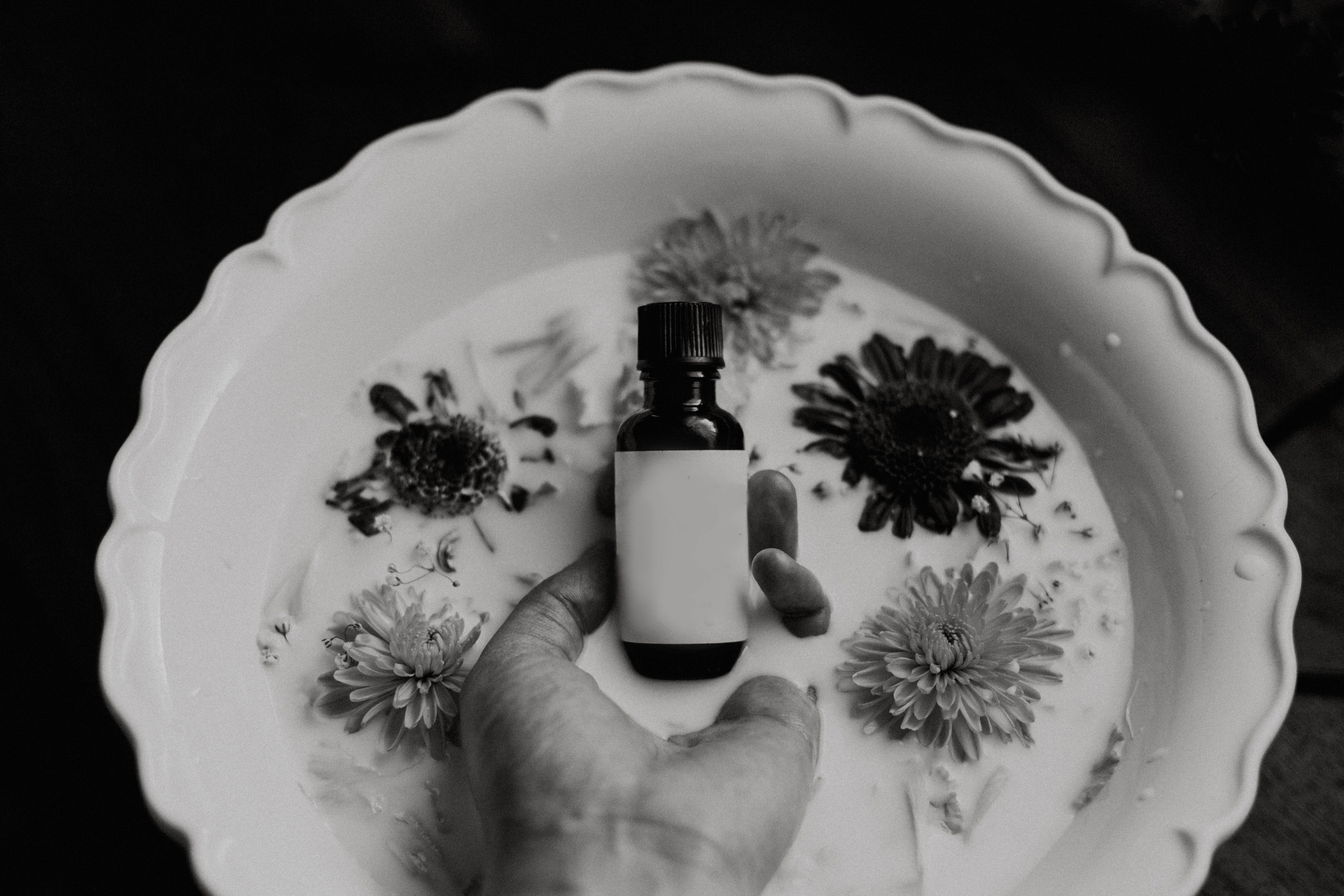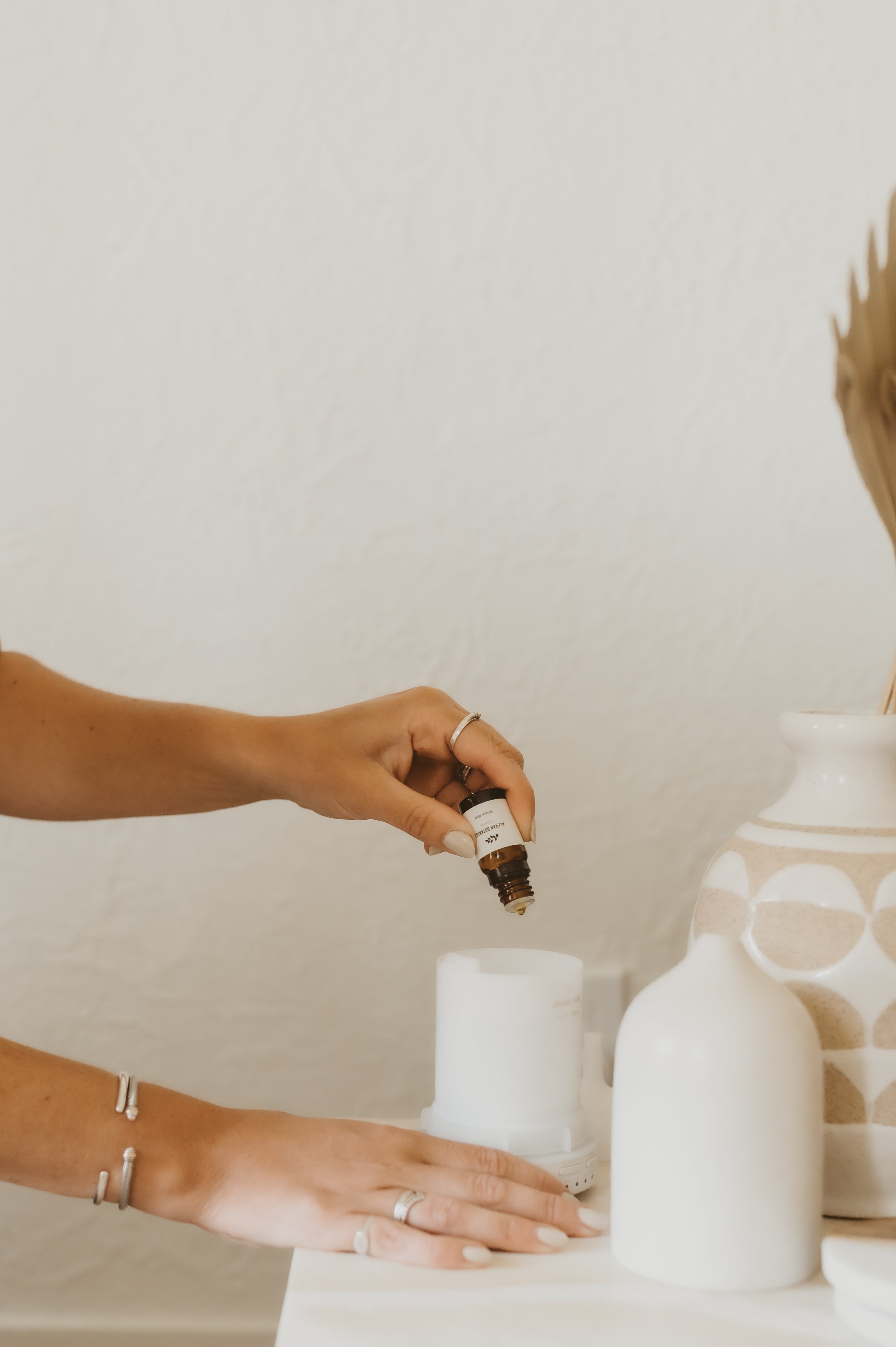In Ayurveda, the postpartum saying goes “42 days for 42 years”; this means the first six weeks are imperative for bonding with the baby and deep healing for a lifetime of vitality, strength and wellness for mama. Our society has often created a “bounce-back” culture and often a culture where due to money and obligations women are re-entering life as usual much before healing and bonding with their baby can occur.
When we turn to the ancient knowledge of Ayurveda, pregnancy and childbirth create a vata dosha imbalance which is where focus on diet, daily routines, herbs and aromatherapy come into play to restore.
Vata dosha is characterized by the air and space elements; the qualities of Vata are rough, dry, mobile, and light. In Ayurveda, the principle of “like increases like, the opposites decrease each other” is a guiding principle as we work to bring balance back to mind, body and spirit. We can think of this vata imbalance quite literally as we are “full” when pregnant, the downward energy of Vata brings our baby to us and after our womb and body is empty and full of space. This space creates lots of room for air to move and therefore our vata becomes imbalanced. The role of nurturing the mother requires us to look at all parts of her: the mind, the body and the spirit. Vata imbalances can become present in the form of anxiety/anxiousness, fatigue, insomnia, dryness of the physical body, the feeling of being cold, constipation or indigestion as well as feelings of isolation and postpartum “blues”. We can nurture the mother by supporting her in diet, rest and self-care practices such as abhyanga (warm oil massages), the use of aromatherapy, healing herbs/teas, among others. The sacred window phase can be a time of utmost rejuvenation with the potential to be the most rejuvenating and fulfilling time of a woman’s life.
The sacred window occurs from birth of mother and baby until forty-two days after birth. This is a time of utmost importance for the mother for healing, rest and bonding with her baby. As the newborn is new to the world, the woman also becomes a “newborn” mother. What I love about studying ancient practices is the focus and emphasis on the “sacred”, something that is most often lost in today’s fast-paced, bounce-back culture. How can we bring back the sacred ritual of diffusing a lavender essential oil blend each evening or a quiet meditative time while enjoying a healing sitz bath of herbs and essential oils? When I speak with most of my clients, it is so ingrained that these things are a luxury or indulgence when really they are ever so important for mental, physical, emotional and spiritual well-being. Ayurveda teaches that complete rejuvenation is of the utmost importance to the new mother in order to avoid rapid aging, autoimmune issues, fatigue, depression, anxiety, among other ailments. During the sacred window, the use of essential oils can be used to support parts of the mother including mood, energy, digestion, aches and pains, perineal healing and headaches. Although the sacred window is a finite phase of time in a new mother’s life, I love the phrase once told to me as I began to plan for my own postpartum phase, “Postpartum is forever.”
Essential oils are an important part of an Ayurvedic lifestyle, especially during the postpartum phase. Although women can experience imbalances in any of the doshas, and sometimes more than one, vata dosha is the most imbalanced after birth and therefore a big focus during the postpartum sacred window is balancing of this dosha. Vata is composed of the air and space element; after the birth of a child, there is a lot of air and open space, or void, in the body as the uterus shrinks back to pre-pregnancy size and organs replace their usual positions. Vata dosha is also downward energy, which birthing the ultimate act of downward energy. Vata imbalances often appear through nervous system signs such as restlessness, anxiety, hypersensitivity, or the feeling of being “spaced out” or not “grounded”. Physical manifestations of vata imbalance include hair loss, constipation, and overall dryness of skin and internal organs.
How can we focus on vata dosha in the postpartum phase? A big part of this is re-learning the norm in our Western society. We can bring balance to vata by sitting or lying down for weeks after birth to allow the body to heal, consuming ghee with our meals, oil massage for skin daily, and consuming all things warm. Vata can also be balanced through relaxation practices such as diffusing grounding and centering oils. Inhaling the aromas of essential oils is particularly helpful for Vata imbalances, as smell and breath work on our “prana vata”; our prana vata is our life force, or vital, energy that brings breath through the body. Prana vata is one of the most important parts of our existence; we cannot live without breathing air. For vata postpartum imbalances, wood, resin, root and seed oils are great to blend for inhalation blends, diffuser blends or essential oil blends for massage oils for grounding and centering. For postpartum balance of the Vata dosha, it is important to focus on daily oil massages with essential oils, warm and nourishing meals, and rest.
The hormonal shifts that occur after birth are massive which can lead to instability of emotions and feelings; not including adding in lack of sleep. To bring balance, nervine and grounding essential oils are important to add in throughout a new mom’s day. For daytime diffuser or inhaler blends, a focus on citrus oils such as bergamot, sweet orange and grapefruit add uplifting energy. In particular, grapefruit reduces excess kapha congestion mentally and emotionally; kapha congestion shows up in feelings of sadness, heaviness or lethargy. For anxiety, ylang ylang is a powerful essential oil that benefits all doshas; it soothes vata-induced anxiety, cools pitta-fueled anger, and balances kapha emotions. Ylang ylang is also a flower which connects to love and the heart space; helping the new mom feel love for herself and her baby. In addition to the above mentioned essential oils, I have had success with grounding and soothing blends specifically to be used in the evening in massage oil blends for postpartum women. Grounding oils for postpartum use include vetiver, frankincense, lavender and cedarwood.
The methods of application, in my experience, that work the best for postpartum women are methods that are easy to use, accessible and do not require much preparation, especially in the early weeks of sleep deprivation and adjustment to new life routines. If a woman is familiar with essential oils and has some of her own already, lavender and lemon are a great blend for mood and energy that can be used right away in a diffuser or on a cotton ball for deep breaths throughout the day. Lavender is an amazing oil that blends well with most other oils; it is a true harmonizer. Diffuser blends, inhalation blends, massage oils that can be applied to soles of feet before bed and/or roller blends to apply to pulse points have all been successful and claimed as useful to postpartum women I have worked with.
Some recommended Alevan Botanica products for use in the postpartum period include our Evening Spritz, our Divine Diffuser Blend, and our Bliss Roll-On.



